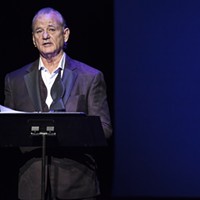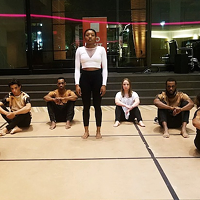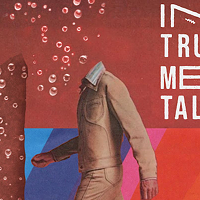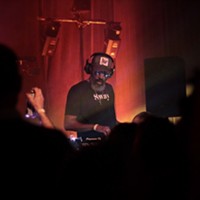Bass for your face: Is Charlotte becoming Electronic Dance Music central?
If DJ Odi and other EDM vets have anything to do with it, the answer is yes.
By Jeff Hahne @jhahnePage 2 of 3
"I used to play more aggressive, techno-influenced stuff," Odi says. "Now, I play more organic, bouncy stuff, but I mix in everything in between."
Drum-and-bass, also known as jungle, is the ultra-fast dance-music style that developed out of the U.K. rave scene of the 1990s. In New York City, its skidding and clattering, 160- to 180-beats-per-minute onslaughts dovetailed naturally with the city's breakbeat scene, and by the middle part of the decade drum-and-bass was the hottest thing in dance music since Detroit techno or British acid house. It produced genuine stars — Goldie, Roni Size — and bubbled into the rock world when David Bowie incorporated the sound into his 1997 album, Earthling. By the late '90s, D&B's hip factor had waned, replaced by dubstep, which ushered EDM into the 21st century. Today, says Odi, drum-and-bass is enjoying something of a resurgence, due in part to the nostalgia of clubbers in their 30s.
A pioneer of the drum-and-bass subgenre hipstep, which adds more hip-hop to the D&B mix, Castillo is currently building a studio in NoDa to produce, record and engineer music for himself and other DJs. But his priority is performing. As DJ Odi, he headlines a handful of gigs for crowds of 250 to 500 in cities like D.C. and New York each month. Those shows pay Odi's bills, while his Crown Station events are more about having fun and helping to expand Charlotte's EDM scene.
"With Konkrete Jungle, Spencer and I are trying to give people who grew up loving raves and drum-and-bass shows the opportunity to go out again," says Castillo, who is 36. "This is the music we grew up on. Life gets in the way, but people can go out again." He also says that younger people in their teens and 20s who currently like dubstep will likely get tired of the more experimental nature of that style and gravitate back to the more energetic sounds of drum-and-bass. "It's always a party," he says. "It's not a listening party."
The son of a bass-player father who hosted one of the first Latin-jazz radio shows in the country, and a salsa-dancing mother, Castillo always had music coursing through his veins. He grew up in a lower-middle-class part of Harlem — a block from the projects, where hip-hop was thriving, and three blocks from the Apollo Theater. He was 9 when he discovered the excitement of dance music. His babysitter was a DJ who lived in an apartment below the one where Castillo lived with his mother, who by then was divorced and single. Castillo would go downstairs and spend his time surrounded by his babysitter's comic books, vinyl records and DJ equipment. "I thought, 'He's so cool!' I wanted to be like him," Castillo says.
Two years later, Castillo was singing with the Boys Choir of Harlem. One day, after leaving rehearsal and calling his mom from a pay phone across the street, he was hit by a car and badly injured. He spent the next four years in hospital beds and wheelchairs, during which time he had little more to do than take the elevator down to his babysitter's apartment and practice his mixing and scratching. "By the time I was walking again, I had mixtapes and was soon DJing in my neighborhood," he says.
When Castillo wasn't hanging out at his babysitter's place, he was at home listening to DJ mix shows on New York radio stations — Little Louie Vega on Hot 103 and Frankie Bones on B96 FM — until 2 a.m. "You hear, 'Imitation is the most sincere form of flattery,' but it's also the best way to learn any art," he says. "A new guitar player is going to learn 'Stairway to Heaven' or 'Hotel California.' It's the same thing with DJing culture. I learned how to scratch by copying other DJs and learning patterns."
At 15, Castillo was just another latch-key kid living in upper Manhattan, getting into drinking, doing drugs, skipping school, not coming home for days. His mother was at her wit's end. With the settlement money from his accident controlled by the courts, she told a judge she couldn't handle her son anymore and wanted to send him to military school. The judge's reply: "How much do you need?"
New York Military Academy helped calm Castillo down, but not by his choice. "You know all the horrible stuff you see in movies about academies? All that happened," Castillo says of the hazings and beatings he received. After graduation, he enrolled in a pre-college program at Columbia University, but that only lasted a couple of weeks. "My ride to the rave was leaving," Castillo jokes. "I can always go back to school. I think I made the right decision in choosing to be a DJ instead."
Dharma Lounge.
9:30 p.m., March 9, 2012.
Speaking of...
Latest in Music Features
More by Jeff Hahne
-

Chvrches ups the energy
Oct 17, 2018 -

Florence & The Machine offer a vocal showcase in Charlotte area
Oct 4, 2018 -

Bill Murray, Jan Vogler and Friends entertain with wit, classic arts
Oct 2, 2018 - More »
Calendar
-
SAINT MOTEL - The Awards Show @ N.C. Music Factory
-
Wage War & Nothing More @ N.C. Music Factory
-
Taylor Acorn @ Amos' Southend
-

Famed Blues-Rocker Coco Montoya Celebrates New Album at the Neighborhood Theatre! @ Neighborhood Theatre
-
The Price Club Tour: Connor Price @ The Underground
-
Angela Saylor Brings Her Electronic Music Project 'Minthill' Back Home
The Art of Memory
-
Evanescence, Lindsey Stirling bring new energy to PNC Music Pavilion
Band backed by orchestra bring renewed life to their songs.
-
Take a trip to Margaritaville - Jimmy Buffett giveaway 35
Win two tickets to his Charlotte concert on April 21.

















